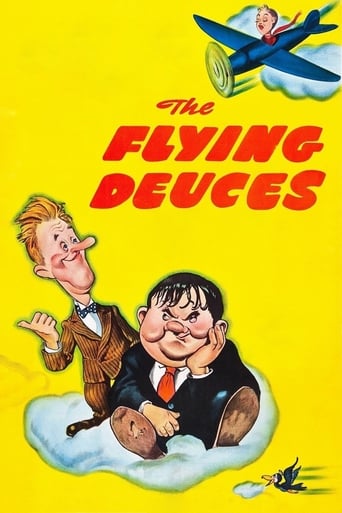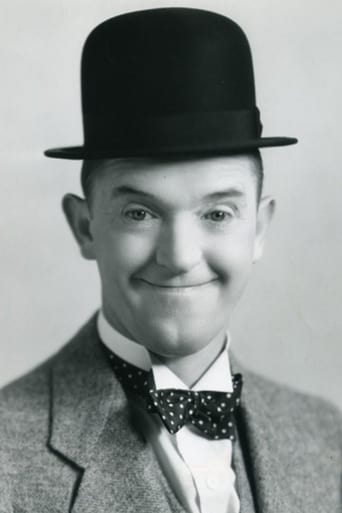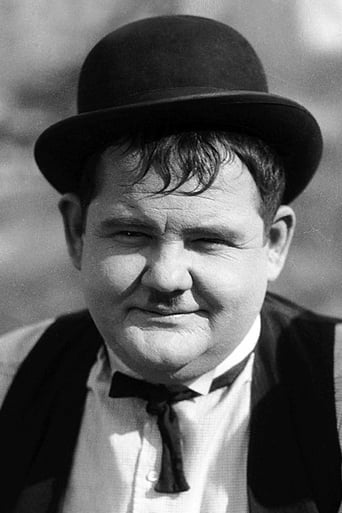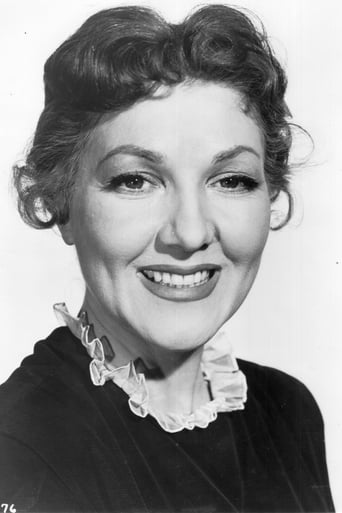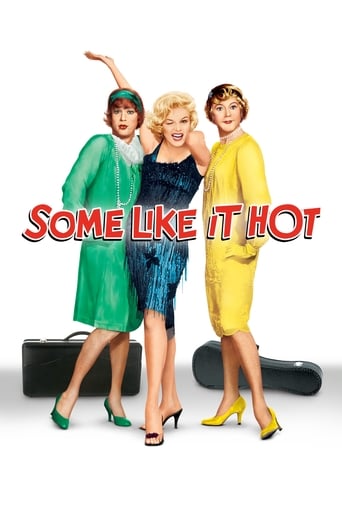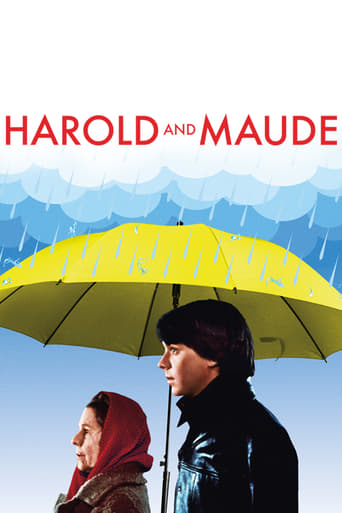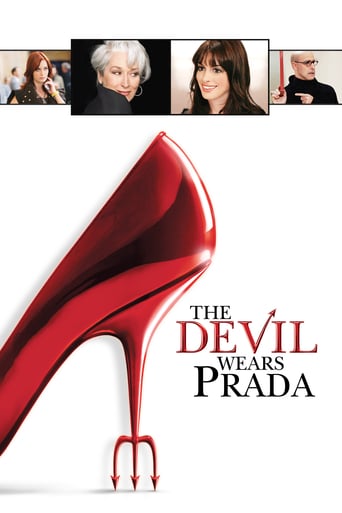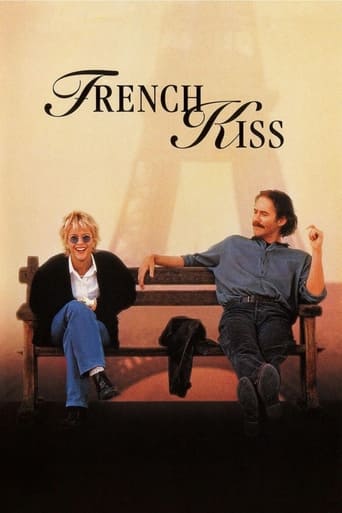The Flying Deuces (1939)
Ollie falls in love with a woman. When he discovers she's already married, he unsuccessfully attempts suicide but he and Stan then decide to join the Foreign Legion to get away from their troubles. When they’re arrested for soon trying to desert the Legion—they escape a firing squad by stealing an aircraft.
Watch Trailer
Free Trial Channels
Cast


Similar titles
Reviews
Instead, you get a movie that's enjoyable enough, but leaves you feeling like it could have been much, much more.
It really made me laugh, but for some moments I was tearing up because I could relate so much.
A film of deceptively outspoken contemporary relevance, this is cinema at its most alert, alarming and alive.
Close shines in drama with strong language, adult themes.
A rather bizarre but nonetheless amusing and vastly entertaining addition to the Laurel and Hardy canon, this film re-united the team after a year of enforced separation (during which Hardy teamed with Harry Langdon for Zenobia) owing to Babe's contract over-run with Hal Roach. The movie was made on the RKO lot for independent producer Boris "Man on a String" Morros. Before achieving his later notoriety as a counterspy, Morros was a musician who conducted the Paramount Studio Orchestra in the 1930s. Perhaps it was his influence that led to the inclusion of two remarkably choice highlights in The Flying Deuces: In the first, the camp orchestra which is playing an innocuously atmospheric "desert sands" theme, suddenly as the comedians draw near bursts into "Shine On, Harvest Moon". Delightedly, Oliver himself sings the refrain while Stan gives one of his splendidly loose-limbed jigs. Oliver then joins in the dance, lifting his coat-tails in an exaggerated curtsy. Both dancers step off in a marvelous exit, raising their derbies in true vaudevillian style. In the second musical highlight, Laurel "performs" (with the assistance of an expert off-camera harpist) an inspired Harpo Marx take-off by strumming an hilariously inappropriate "The World Is Waiting For the Sunrise" (the duo are due to be shot at dawn) on an improvised bed-spring. Both these sequences are superbly timed and executed whereas a few of the other comedy acts seem a little forced (the prisoners fending off their pursuers by popping champagne corks), or a trifle overlong (the airplane acrobatics), or even mechanical (Laurel repeatedly bumping his head on a low ceiling). Nonetheless, Flying Deuces is vintage L&H. One of their funniest wheezes ever is an eye-boggling scene in which Stan attempts to find a vacancy on a hillside crowded with drying shirts - a chucklesome conceit climaxed by classic routines (Oliver agitatedly scrubbing a wash-board in a vain bid to look busy) and exchanges ("Now concentrate on trying to forget . . ."). All the same, Flying Deuces is thoroughly a-typical in its astonishingly bizarre plot and premises. And it was doubt¬less to embellish some of these sequences and effects that Rudolph Maté was hired. At this time, Maté was a leading cameraman. He had actually photographed L&H's Our Relations in 1936 but neither of the comedians liked his work. They preferred flat lighting and insisted that their regular cameraman, Art Lloyd, be borrowed from Hal Roach to photograph their scenes. Lloyd's work, with its dated use of highlights and pancake make-up gives the film a museum look that makes it appear far more ancient than 1939. Jumpy film editing and echo-chamber sound add to this impression. Yet The Flying Deuces has been rather handsomely produced, with lots of extras, elaborate sets, aerial photo¬graphy by Elmer Dyer, and an agreeable support cast led by Reginald Gardiner, Charles Middleton, James Finlayson (in a small cameo) and Jean Parker. Above all, it's a very funny, very entertaining film which doesn't deserve its mixed or mediocre reputation. The basic story is certainly odd - but should it be con¬demned on that point? In any event it serves as a peg for some wonderfully inventive Laurel & Hardy buffoonery.
This is my second attempt in reviewing a movie that connects two classic movie comedy teams: Laurel & Hardy and Abbott & Costello. In this case, the connection is the director but I'll get to that later. Having just reunited with Oliver Hardy after Hardy briefly went solo in Zenobia due to some contract dispute with Hal Roach, Stan Laurel and Ollie would be loaned to independent producer Boris Morros for The Flying Deuces. It ended up being a remake of their four reeler Beau Hunks with Charles Middleton once again playing a mean commandant. In this one, Ollie is trying to forget a girl who turned him down for marriage so he and Stan join the Foreign Legion. Plenty of funny gags abound during the first 30 minutes while the last 40 is uneven especially toward the end but the boys are charming throughout even during the number "Shine On, Harvest Moon" with Hardy warbling while Laurel dances though I did wonder if Stan really played the harp in a later jail sequence (probably not, judging from Ollie's reactions). Among Roach veterans involved are cameraman Art Lloyd, writer Charles Rogers, and usual L & H supporting regular James Finlayson. Another writer, comic Harry Langdon, also provided the drawing of the boys in the first scene (and perhaps during the opening credits). One more note about the supporting cast: Jean Parker, who plays the girl Ollie's trying to forget, had previously played his daughter in Zenobia. That movie's producer was A. Edward Sutherland who also directed this film. He didn't like the experience as he wasn't accustomed to the star calling some of the shots. In fact, before his death, Sutherland said of Laurel, "I'd rather have worked with a tarantula." He probably had a much better time the following year when he introduced another comedy team on film that had just finished a Broadway run in "Streets of Paris"... P.S. This was where Hardy met his future wife, Virginia Lucille Jones, who was the script clerk here.
I love this Laurel and Hardy film. "The Flying Deuces" proves to be faster paced and less redundant than many of their other films. Not that I don't love Laurel and Hardy, but it's hard for me to find one of their feature films where I am completely entertained the whole way through. In this movie, Stan and Ollie join the foreign legion so Ollie can forget his girlfriend who has rejected him. Along the way, they get in trouble and end up being chased by the entire foreign legion. It's a typical L & H plot, but this one remains entertaining because of great gags such as the shark scene and of course the famous airplane crash at the end. Stan's dialogue is especially great in this film. I like their other features such as "Way Out West" and "Our Relations" but this is and has always been my favorite. Their shorts are better, but this is very enjoyable and worth watching multiple times.***1/2 out of ****
In 1939 - 1940 Laurel & Hardy's long contractual relationship with Hal Roach was coming to an end. The boys actually never had a joint contract with Roach - Stan and Babe had signed up in the 1920s at different times. Stan's contract was ending first, but Babe's would be finished within a year.Most people assume that the three men worked very smoothly together. The decline in their work is ascribed to a lack of sympathy shown them by MGM and 20th Century Fox in the 1940s. This is not quite true. Roach, as a producer, was cost conscious, and if he felt something was over-budget he squawked. This led to collisions with Stan. At least once it harmed a film - the feature "Swiss Miss", where a vital element in the scene involving the rope bridge was dropped. Similar cost cutting may have hurt "Bonnie Scotland" (which has an ending that does not even try to settle a plot problem). As early as 1937 Roach began to look into ending the boys partnership. He tried to create a "Hardy" family series (no pun intended) in which Babe was married to Patsy Kelly, and their son was Spanky MacFarlane. A still photo exists of Babe holding Spanky (both trying to out-stare each other) with Patsy looking somewhat bemused. But nothing came of this. In 1939 Roach produced the film "Zenobia", starring Babe as a small-town physician in the anti-bellum South. A request to help a circus elephant causes him trouble. The owner of the elephant is Harry Langdon, and there were rumors at the time that Roach was toying with a new teaming of Hardy and Langdon.Under the circumstances of Roach's antics, it is just possible that the decision of Stan and Babe to make "The Flying Deuces" with Boris Morros as producer was a counter-move: a type of testing the waters to see if the boys needed Roach to be there in order to make successful comedy features. If so, they were smart to do it. "The Flying Deuces" is not one of their greatest comedies (like "Sons Of The Desert") but it is a very amusing one.Although a story and screenplay is listed as the source of the film, one imagines the real source goes back to a short subject movie made a few years earlier called "Beau Hunks". In that short Babe is broken hearted because the woman he loves has married another man. The woman in question is actress Jean Harlow. Babe insists that he must join the Foreign Legend in order to forget his false love. But he insists Stan go with him. Stan can't quite grasp this - why should he join, as he has no reason to forget anyone. Babe immediately says that it is selfish of Stan not to join his friend in trying to forget. So they leave for North Africa. The rest of the short deals with their hard life as legionnaires (under Commandant Charles Middleton) and the fact that the horrified Hardy keeps finding that every man in the Foreign Legion is there trying to forget Jean Harlow (as is the leader of the Riffs!).As you can see there are elements in "Beau Hunks" that are picked up in "The Flying Deuces". Here, while in Paris, Hardy falls for Jean Parker, but she has a boyfriend. Hardy resolves on suicide in the Seine, and ties a heavy weight to himself AND Stan (who should share his fate, as a good friend). But they are prevented by French Legionaire officer Reginald Gardiner, who convinces them to join the Legion in order to forget the sad affair. They agree (Stan is told to get rid of that thing, promptly unties himself from the weight, and throws it into the Seine, causing Ollie to be pulled in). They show up in North Africa, at a fort run by Charles Middleton, and discover that Gardiner is an officer there too - as is his new wife, Jean Parker!The difference in the two films is that the feature enables more material to be put in. When they are going to their quarters, Stan and Ollie break into a soft shoe and song of "Shine On Harvest Moon" (no doubt influenced by similar moments where they did singing and dancing in "Way Out West" the year before. They get into trouble when they are outraged with the small pay they have unwittingly agreed to by signing up. Their behavior keeps escalating until they end up in the guardhouse, awaiting court martial and probable execution, with Jimmy Finleyson as their jailer. And then they make a final break for freedom at the controls of an airplane. The plane crashes, and (for the only time in their films) one of them dies...temporarily. Earlier they had a discussion on reincarnation, and now they see the wisdom of that theory.It is an extremely amusing film for all the players (Middleton having a royal fit when he reads an insulting message left by Hardy on his desk; Gardiner going ballistic finding the boys in Parker's boudoir with her, and Finleyson unable to understand how the boys as well as nearly twenty soldiers raced into the cell they were locked into - so that he couldn't find them - and then they all reappeared). While not as polished as their best work, it certainly was in the top of their second tier of good feature films (better, anyway, than "Bonnie Scotland").It may have worked for awhile. After "Zenobia" and "The Flying Deuces", Roach did not seem to bring up re-teaming Babe with anyone. The boys made "A Chump At Oxford" and "Saps At Sea" with Roach. Then both contracts were over. Unfortunately, they then signed with MGM and 20th Century Fox, and the long decline began in earnest.

